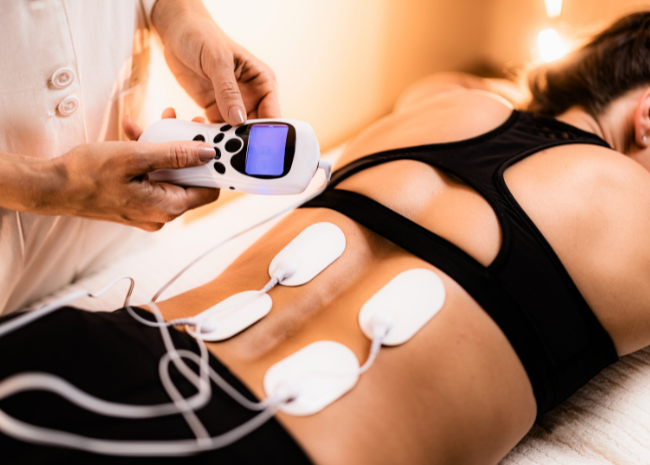
Transcutaneous Electrical Nerve Stimulation (TENS) and Pain Relief
If you have suffered from acute or chronic pain—including tendinitis, bursitis, osteoarthritis, fibromyalgia or recurrent back pain—you may have been treated with transcutaneous electrical nerve stimulation (TENS).
This frequently used treatment is widely considered safe for many conditions. In fact, you may have even seen inexpensive units marketed for home use.
This begs the question:
Will a TENS unit help with lower back pain?
The most likely answer: not completely.
How TENS Works
First, it’s important to understand how TENS works.
TENS units use electrical stimulation and electrothermal therapy to deliver short-term pain relief by placing electrodes on the skin and delivering a low-voltage electrical current.
While researchers are not sure how the therapy relieves pain, they believe the electricity stimulates nerves, confusing the brain and blocking pain signals from getting through.
Limitations and Long-Term Efficacy
Here’s the thing: while these units can be purchased for at-home use, and they can be effective in the short term for many conditions, they are not a substitute for addressing the root cause of pain.
The effectiveness of TENS for long-term pain management, especially for chronic conditions like persistent low-back pain, is less clear. Simply controlling pain is rarely the best course of treatment.
The American Academy of Neurology, after reviewing various studies, has concluded that TENS has not shown consistent effectiveness in reducing chronic low-back pain over periods lasting three months or longer.
Why TENS May Not Work Long-Term
- Treatment of Symptoms, Not Causes: TENS primarily addresses pain symptoms rather than treating the underlying causes of pain. While it can provide temporary relief, it does not resolve issues such as muscle imbalances, structural abnormalities, or degenerative conditions that contribute to chronic pain.
- Adaptation and Tolerance: Over time, the body may become accustomed to the electrical stimulation from TENS units. This can lead to diminished effectiveness as the nerves adapt, requiring higher intensity settings that may not be suitable or safe for long-term use.
- Lack of Consistent Evidence: Despite its widespread use, conclusive evidence supporting the long-term benefits of TENS for chronic pain management remains limited. Studies often report mixed results, with some individuals experiencing significant pain reduction while others see minimal or no improvement.
Comprehensive Pain Management
For individuals experiencing chronic low-back pain or other persistent conditions, a holistic approach to pain management is typically recommended. This approach may include:
- Physical Therapy: Engaging in targeted exercises and stretches designed to strengthen muscles, improve flexibility, and correct posture can help alleviate pain and prevent future episodes.
- Medical Evaluation: Consulting with healthcare professionals to identify and address the underlying causes of pain, such as disc herniation, spinal stenosis, or arthritis, is crucial for developing an effective treatment plan.
- Multimodal Therapies: Combining treatments such as physical therapy, medications, injections, and lifestyle modifications can provide more comprehensive and sustained pain relief than relying solely on TENS therapy.
Comprehensive Treatment Approach
At The Jackson Clinics, we can design an individualized program of strengthening and stretching exercises, and guide you through the exercises here in our office.
Performing these regularly will not only speed recovery but also keep your muscles, joints and discs healthy, lessening the chance of future back pain episodes.
Did you know you have Direct Access* to Physical Therapy? No referral, no problem!
While TENS units offer a non-invasive and generally safe method for managing acute pain, their long-term efficacy for chronic conditions like low-back pain is uncertain.
If you live in the Northern Virginia area, don’t hesitate to reach out to us today before you purchase an at-home TENS unit. If you suffer from low-back pain or another ailment, make an appointment so we can assess your symptoms and the causes of your pain.
The most effective long-term treatment will almost always include a course of exercises that you can perform at home.
















